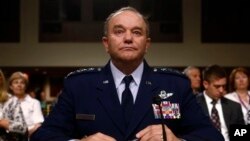WASHINGTON —
President Barack Obama's nominee to become NATO's supreme allied commander said on Thursday the so-called reset in U.S. ties with Russia was now on pause and predicted that Moscow would be the "primary actor of regional concern" through 2020.
Relations between the former Cold War foes, badly damaged by Russia's 2008 war with pro-Western Georgia, had improved during Obama's first term and Obama signed a nuclear arms treaty with then-President Dmitry Medvedev in 2010.
But ties have soured since Vladimir Putin returned to Russia's presidency in May, and Washington and Moscow have been at odds over issues ranging from Syria to human rights.
Eight former U.S. and Russian ambassadors urged swift action to improve relations in a joint statement released on April 2, noting a growing trend toward issues that divide the two nations.
U.S. Air Force General Philip Breedlove, in written testimony, said Russia remained an aspirational superpower but noted that it remained hindered by what he called "endemic deficiencies."
"Russia will remain the primary actor of regional concern through 2020 by virtue of its geographic position, natural resource wealth, military forces, and desire for regional influence," Breedlove said. "The U.S. and NATO will need to continue to assure our allies and partners, who live in the Russian self-declared sphere of privileged influence, of our resolve."
Disagreements between the two veto-wielding members of the U.N. Security Council over the conflict in Syria, where more than 70,000 people have been killed in two years, have been a factor frustrating hopes for a solution there.
Putin, who accuses the United States of using human rights as a geopolitical tool, was angered by a U.S. law adopted in December to punish Russians deemed rights abusers by barring them from the United States and freezing their assets there.
Russia responded with similar measures and also banned U.S. couples from adopting Russian-born children. Moscow ejected the U.S. Agency for International Development (USAID) in October and has clamped down on foreign-funded advocacy groups.
"I have described the reset as sort of on pause," Breedlove said. "We had made some progress. There were some political changes in Russia and we are now sort of very much slowed down."
At the same time, Breedlove said it was important that the United States keep engaging with Russia and stop treating it like an enemy. He noted how helpful Moscow had been in counter-piracy efforts.
"I think that Russia still has deep influence in Europe and we need to try to find out how to work with them," he said.
Last month, Russian and U.S. defense chiefs signaled their intention to reconvene long-stalled missile defense talks following a change in missile defense plans for Europe that has been met cautiously by Moscow.
Russia has announced that Tom Donilon, White House national security adviser, will visit Moscow next week for talks, including on U.S. missile defense plans.
Breedlove was testifying before the Senate Armed Services Committee. He needs Senate approval to replace Admiral James Stavridis, who is stepping down after nearly four years as NATO's supreme allied commander, Europe, and head of the U.S. military's European Command.
Relations between the former Cold War foes, badly damaged by Russia's 2008 war with pro-Western Georgia, had improved during Obama's first term and Obama signed a nuclear arms treaty with then-President Dmitry Medvedev in 2010.
But ties have soured since Vladimir Putin returned to Russia's presidency in May, and Washington and Moscow have been at odds over issues ranging from Syria to human rights.
Eight former U.S. and Russian ambassadors urged swift action to improve relations in a joint statement released on April 2, noting a growing trend toward issues that divide the two nations.
U.S. Air Force General Philip Breedlove, in written testimony, said Russia remained an aspirational superpower but noted that it remained hindered by what he called "endemic deficiencies."
"Russia will remain the primary actor of regional concern through 2020 by virtue of its geographic position, natural resource wealth, military forces, and desire for regional influence," Breedlove said. "The U.S. and NATO will need to continue to assure our allies and partners, who live in the Russian self-declared sphere of privileged influence, of our resolve."
Disagreements between the two veto-wielding members of the U.N. Security Council over the conflict in Syria, where more than 70,000 people have been killed in two years, have been a factor frustrating hopes for a solution there.
Putin, who accuses the United States of using human rights as a geopolitical tool, was angered by a U.S. law adopted in December to punish Russians deemed rights abusers by barring them from the United States and freezing their assets there.
Russia responded with similar measures and also banned U.S. couples from adopting Russian-born children. Moscow ejected the U.S. Agency for International Development (USAID) in October and has clamped down on foreign-funded advocacy groups.
"I have described the reset as sort of on pause," Breedlove said. "We had made some progress. There were some political changes in Russia and we are now sort of very much slowed down."
At the same time, Breedlove said it was important that the United States keep engaging with Russia and stop treating it like an enemy. He noted how helpful Moscow had been in counter-piracy efforts.
"I think that Russia still has deep influence in Europe and we need to try to find out how to work with them," he said.
Last month, Russian and U.S. defense chiefs signaled their intention to reconvene long-stalled missile defense talks following a change in missile defense plans for Europe that has been met cautiously by Moscow.
Russia has announced that Tom Donilon, White House national security adviser, will visit Moscow next week for talks, including on U.S. missile defense plans.
Breedlove was testifying before the Senate Armed Services Committee. He needs Senate approval to replace Admiral James Stavridis, who is stepping down after nearly four years as NATO's supreme allied commander, Europe, and head of the U.S. military's European Command.













